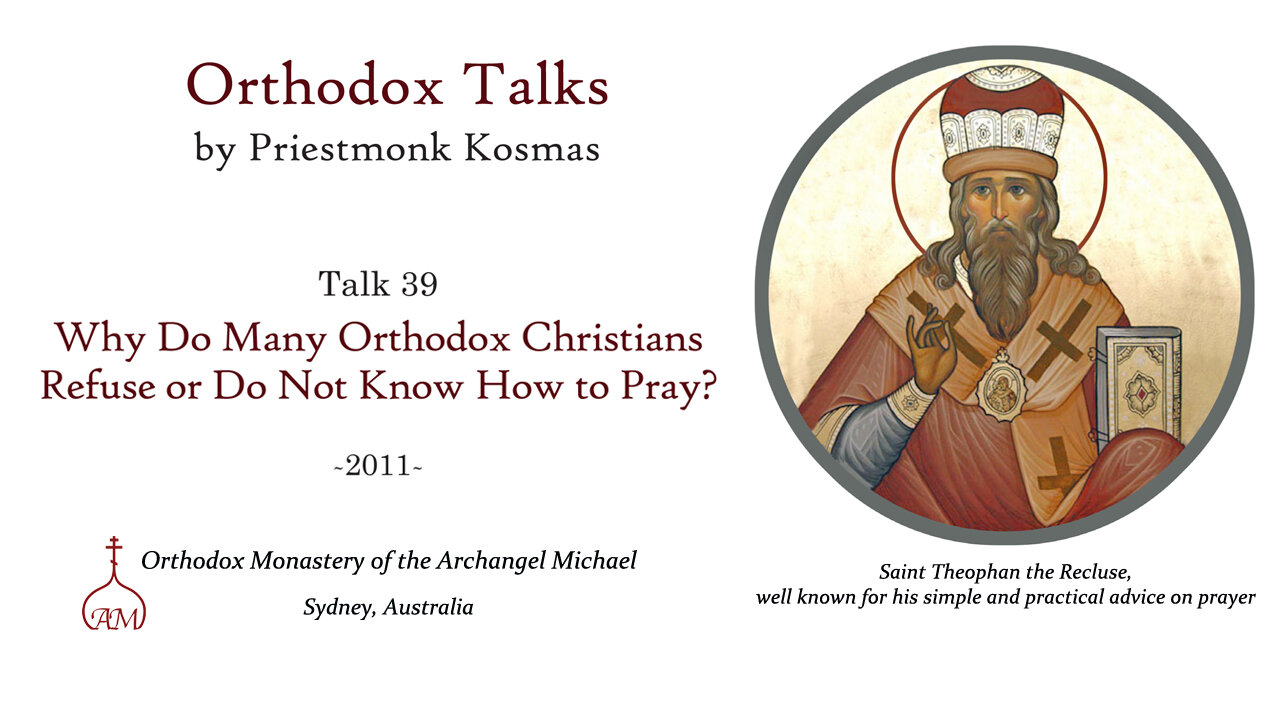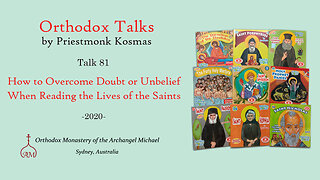Premium Only Content

Talk 39: Why Do Many Orthodox Christians Refuse or Do Not Know How to Pray?
Orthodox Talks by Priestmonk Kosmas, Sydney, Australia
iTunes: https://podcasts.apple.com/us/podcast/orthodox-talks/id1659252607
Spotify: https://open.spotify.com/show/0sKZoGUhAjJua9RtjoZS73
Podcast: https://rss.com/podcasts/orthodoxtalks/
In the writings of the Holy Fathers we often read fearful statements regarding prayer, such as: “Whoever refuses to pray rejects his salvation”; “There can be no progress in the spiritual life without prayer”; “Without prayer there can be no victory over the demons”; “There is nothing more important than prayer”; and “Prayer is food for the soul – it is better to let the body starve than for the soul to go hungry.” Despite these warnings, Orthodox Christians frequently either do not know how to pray or, even worse, refuse to pray.
Using mainly the writings of Saint Theophan the Recluse, Father Kosmas offers simple and practical advice on the topic of prayer. He emphasizes the importance of always considering oneself a beginner with regard to prayer, and explains how such humility draws the grace of God into our souls.
The following questions are also discussed: what effect does technology, especially the Internet, have on one’s prayer life? Why did one drunken deacon’s face shine with God’s grace? Is Saint Paul’s commandment to pray without ceasing unrealistic for those in the world? Why is it unfruitful to take on too many prayers? How does one deal with wandering thoughts? What is meant by ‘time distortion’ in prayer? Are prayer ropes only for monastics? Is it beneficial to form mental images during prayer?
Other points covered in this talk include: a fearful story of one young man’s spiritual disaster due to false prayer; a saint’s attitude towards those who do not pray; coldness and deadness in prayer; the danger of rushing through one’s prayers; how bows and prostrations help one to pray; demonic temptations during prayer; the importance of the morning and evening prayers from the prayer book; a very short prayer rule given by Saint Seraphim of Sarov; boredom during prayer; and the dangers of expecting an instant prayer life.
-
 4:44:34
4:44:34
Orthodox Talks
2 years agoTalk 81: How to Overcome Doubt or Unbelief When Reading the Lives of the Saints
2.55K -
 2:56:28
2:56:28
IsaiahLCarter
18 hours ago $11.30 earnedThe Tri-State Commission, Election Weekend Edition || APOSTATE RADIO 033 (Guest: Adam B. Coleman)
54.6K7 -
 15:03
15:03
Demons Row
13 hours ago $13.21 earnedThings Real 1%ers Never Do! 💀🏍️
68.9K22 -
 35:27
35:27
megimu32
17 hours agoMEGI + PEPPY LIVE FROM DREAMHACK!
190K15 -
 1:03:23
1:03:23
Tactical Advisor
20 hours agoNew Gun Unboxing | Vault Room Live Stream 044
272K41 -
 19:12
19:12
Robbi On The Record
21 hours ago $25.16 earnedThe Loneliness Epidemic: AN INVESTIGATION
100K119 -
 14:45
14:45
Mrgunsngear
1 day ago $151.02 earnedFletcher Rifle Works Texas Flood 30 Caliber 3D Printed Titanium Suppressor Test & Review
158K35 -
 17:17
17:17
Lady Decade
1 day ago $12.93 earnedMortal Kombat Legacy Kollection is Causing Outrage
104K24 -
 35:51
35:51
Athlete & Artist Show
1 day ago $21.13 earnedIs Ryan Smith The Best Owner In The NHL?
108K17 -
 22:56
22:56
American Thought Leaders
2 days agoCharles Murray: I Thought Religion Was Irrelevant to Me. I Was Wrong.
87.2K66